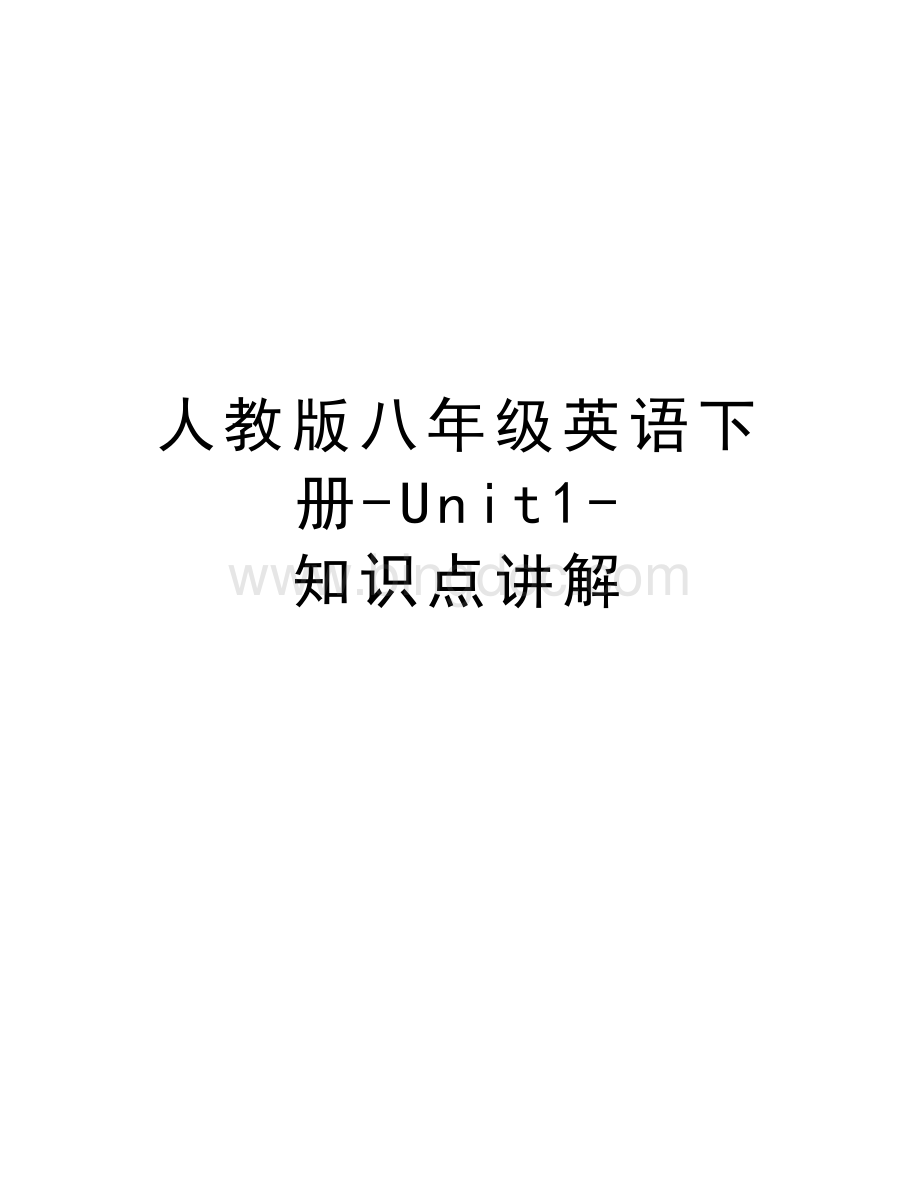人教版八年级英语下册-Unit1-知识点讲解教学内容Word下载.docx
《人教版八年级英语下册-Unit1-知识点讲解教学内容Word下载.docx》由会员分享,可在线阅读,更多相关《人教版八年级英语下册-Unit1-知识点讲解教学内容Word下载.docx(12页珍藏版)》请在冰点文库上搜索。

They_________beathomenow,Ithink.
我认为,他们现在应该在家。
表示惊讶、赞叹、不满等
How_________Iknowit?
我怎么知道这间事情呢?
注意:
should在以why,who,how等疑问词开头的问句中,意为“竟然,居然,怎么会”,表示意外、惊喜或在说话人看来是不可思议的。
二、其他表示建议的句型
Shallwe/I+do+…?
Shallwe_________forawalk?
咱们去散步好吗?
What/Howabout+doing/sth…?
Whatabout_________swimming?
去游泳怎么样?
Let’s+do…?
Let’s_________and_________them.咱们去看看他们吧。
You’d/We’dbetter(not)+do…?
We__________________waitalittlelonger.
我们最好再稍等一会儿。
Whydon’tyou+do…?
Whydon’tyou_________awalkoutside?
为什么不出去散步呢?
Whynot+do…?
Why__________________awalkoutside?
三、反身代词
表示反射或强调的代词叫做反身代词。
反身代词是由第一人称、第二人称形容词性物主代词或第三人称代词的宾格形式,词尾加self或selves组成。
反身代词可译“本人”、“本身”,为加强语气,也常翻译为“亲自”、“自己”。
不定人称代词one-----oneself.
1、反身代词的分类
数人称
第一人称
第二人称
第三人称
单数
myself
yourself
Himself,herself,itself
复数
ourselves
yourselves
themselves
2、反身代词的用法
说明
作动词的宾语
常用于enjoy,teach,hurt,buy,
introduce,dress,help,
lookafter,getdressed作宾语
Heisteaching_________English.
他在自学英语。
Weenjoyed_________lastnight.
昨天晚上我们玩得很开心。
做介词的宾语
常用于in,on,with,of,after,by作宾语
Shelivesby_________inthecountryside.
她一个人生活在乡下。
做同位语
强调作用、加强语气
Didyoumakethecake_________?
这蛋糕是你亲自做的嘛?
Mr.Black_________isalawyer.
布莱克先生本人就是一名律师。
做表语
强调“自己”
Justbe_________.做你自己就好了。
Maryhasn’tquitebeen_________recently.玛丽最近有些不对劲。
单词的用法
SectionA
1.What’sthematter?
怎么了?
该句常用询问某人患了何种疾病或遇到了什么麻烦,其后用with引出对象。
1).What’sthematterwithsb.?
=what’swrongwithsb.?
=what’sthetrouble/problemwithsb.?
=what’sone’strouble/problem?
e.g.What’sthematterwithTom?
=what’s_________withTom?
=What’sthe_________withTom?
=What’sTom’s_________?
2).matter,名词,“问题,事情”
e.g.Wehaveimportant_________(matter)todiscuss.
我们有些重要的问题要讨论。
3).动词,“要紧,关系重大”
e.g.Itdosen’t_________thatyoucamelate.
2.Ihaveacold.我感冒了。
1).have/get/catchacold“感冒,着凉”
Theoldman_________acoldyesterday.那位老人昨天感冒了。
2).“have+a/an+疾病名称”意为“得了….病”
haveafever,haveacough,haveaheadache…
3.Ihaveasoreback.我背痛。
“Ihaveasore+身体部位”意为“…痛”
辨析sore和ache
sore
形容词,意为“疼痛的;
酸痛的”用于身体部位名词前
sorefeet
sorelegsorethroat
ache
名词,构成复合词
headache;
stomachache
4.liedownandandrest.
1).lie的不同含义及词性变化
单词
词性
词义
现在分词
过去式
过去分词
lie
动词
躺;
平躺
lying
lay
Lain
说谎
lied
Lied
名词
谎言
无
Katy_________(lie)onthebedandreadtheletterlastnight.凯蒂昨晚躺在床上看书。
He_________(lie)tomeabouttheresult.对于结果他对我说了谎。
2).rest动词,“休息,放松”
Mayhimrestinpeace.
have/takearest休息,放松=rest
5.Youneedtotakebreaksawayfromthecomputer.
takebreaks=take/haveabreak休息
Weare_________abreakunderthetree.我们正在树下休息。
6.Yeah,IthinkIsatinthesamewayfortoolongwithoutmoving.是的,我想我以同样的姿势一动不动地坐太久了。
1).Inthesameway:
以同样的方式,以相同的方式
Sheworkedoutthemathprobleminthesameway.
2).without为介词,意为“无,没有,不”
Youcan’tbuythings_________money!
你没有钱就买不了东西。
Heleftwithout_________anything.他什么都没有说就离开了。
7.…Whenthedriversawanoldmanlyingonthesideogtheroad.这时,司机看到路边躺着一位老人。
see/watch/notice/hearsb.doingsth.强调看到/听到的动作的正在进行
see/watch/notice/hearsb.dosth.强调看到/听到的动作的完整性
e.g.Ioften_________him_________inthegardenlastmonth.
上个月,我总是看到他在花园里干活。
(强调全过程)
I_________him_________inthegardenwhenIpassedbyyersterday.
昨天我看见他正在花园里干活。
(强调动作正在进行)
8.Heexpectedmostorallthepassengerstogetoffandwaitforthenextbus.
1).expect+名词/代词“期待;
预料”
Iam_________aphonecallfromher.我正在等她的电话。
2).expecttodosth.
Sheexpectstogotherenextweek.她期望下周去那里。
3).expectsb.todosth.Heexpectedhertogowithhim.
4).expect+that从句Iexpectthathe’llcomebacktomorrow.
9.Buttomysurprise,theyallagreedtogowithhim.
1).toone’ssurprise“使…惊讶的是,出乎…意料”
________my_________(surprise),herefusedtocooperatewithus.
让我惊讶的是,他拒绝与我们合作。
2).agree“同意”
a.agreetodosth.“同意做某事”
b.agreewithsb.
c.agreeonsth.“就某事达成一致”
e.g.Mymotheragreed_________(buy)meanewpen.
Ientirelyagree_________you.
Weagree_________thequestion.
10.辨析thanksto/thanksfor
thanksto
“多亏,由于”,to是介词,其后接名词、代词或doing
thanksfor
“因…而感谢”,for后接感谢的原因,常为名词或doing形式,
Thanks_________you,Iamnotlost.幸亏你我才没有迷路。
Thanks_________sendingmesuchanicegift.谢谢你寄给我这么好的一个礼物。
11.getintotrouble“造成麻烦(或烦恼);
陷入困境”trouble是不可数名词。
beintrouble“再麻烦和困境中”
e.g.Lisa__________________troublewhensheclimedthemountain.
Letushelpthepeoplewhoare_________________.
12.Didyoufalldown?
fall---fell---fallen
falldown
意为“倒下”,强调的是“滑倒,倒下”,不能直接跟宾语,加from连接宾语,falldownfrom,表示“从…摔下”
falloff
“跌落”,强调的是“从某处跌落,摔下来”=falldownfrom
e.g.Thedog_________downdead.那条狗倒下去死了。
Theboy___________________________thetreeandbrokehislegs.
Thegirl__________________thebike.
SectionB
1.Someonefeltsick.
Sick;
生病的,恶心的。
ill也是生病的,也可表示品质恶劣的
辨析sick和ill
sick
既可以作定语,也可以用作表语。
表语时“恶心的”
ill
作定语时:
表示“品质恶劣的”
e.g.EverytimeIgetonaboat,Ifeel_________.
Heisan_________student,becausehesmokesanddrinks.
Ihavetolookaftermy_________sisterhomeathometoday.
2.Someonegothitonthehead.有人头部受到了撞击。
1).gethit为系表结构:
gethit+on/in+the+身体部位的名词,表示“某身体部位受到了撞击”
e.g.Thepoliceofficer__________________ontheshoulder.这位警官的肩膀受到了撞击。
2).hit,“打击,击中”如果强调“集中某人的部位”可以用“hitsb.on/inthe+身体部位”e.g.Thebullethithimontheback.子弹击中了他的后背。
3).hit可以做名词,“轰动一时的成功的人或事;
风靡一时的作品”。
e.g.Thesongwasahitatonce.
3.haveproblemsbreathing
1).breathe,a.动词“呼吸”e.g.Hewasbreathinghardwhenhefinishedtherace.
b.名词,breath,没有“e”
takeadeepbreath深呼吸;
holdone’sbreath屏住呼吸
2).haveproblems(in)doingsth.“做某事有困难或麻烦”
e.g.Ihave__________________English.我学习英语有困难。
4.辨析beusedtodoing/beusedtodo/usedtodo
beusedtodoing
意为“习惯于”,to是介词+名词/doing
beusedtodo
意为“被用来做…”to为不定式符号+do原形
usedtodo
意为“过去常常”,to为不定式符号+do原形
e.g.Iam_________to_________upearly.我习惯早起。
Apenis_________to_________.钢笔是用来写字的。
He_________to_________booksforanhoureveryday.他过去常常每天读一个小时的书。
5.find+宾语+宾补
1).find宾语adj.Wefoundhimdishonest.我们发现他不诚实。
2).find宾语doingWefoundhim_________others’homework.我们发现他在抄别人作业。
3).find宾语副词和介词短语Iamsogladtofindyou_________.我很高兴发现你在家。
Ifoundtheclothes__________________style.我发现这些衣服过时了。
6.辨析runout/runoutof用尽,耗尽
runout
“动词+副词”结构。
相当于不及物动词,后面不接宾语,主语通常是“事物”时间,金钱等
runoutof
“动词+副词+介词”结构。
相当于及物动词,后面可以接宾语,主语通常是“人”
Ourmoneyis_________out.我们的钱快用光了。
Wearerunningout_________money.我们的钱快用光了。
7.辨析sothat/so…that
sothat
“以便,为了”=inorderthat,引导目的状语从句,常与can,could,may,might,will,would,should等情态动词或助动词。
so….that
“如此…以至于”,引导结果状语从句,so为副词,+adj/adv;
that后跟从句。
可以与…enoughtodo…和too…todo…进行同义句转换。
e.g.Theygotupearly__________________theycouldcatchtheearlybus.
Sayslowy__________________Icanfollowyou.
Tomran_________fast_________Icouldn’tcatchupwithhim.
=Tomran_________fast_________catchupwith.
8.so…that用法。
1).so+adj./adv.+that
2).so+adj.+(+a/an)+n.+that
3).so+many/much/few/little+n.that
e.g.Theceilingissohighthatwecouldn’treach.天花板如此高,我们够不着。
Hissonissotallamanthathealmostreachestheceiling.他儿子那么高,几乎够到天花板了。
Katehadsomanyfallsthatshewasblackandblueallover.凯特跌倒了好多次,摔得身体青一款紫一块。
9.giveup放弃
1).“动词+副词”代词做宾语,代词放中间。
giveit/them/him/her…up
2).giveupdoingit’sgoodforyoutogiveup_________.戒烟对你有好处。
10.Ihurtmyselfplayingsoccer.
playingsoccer现在分词做伴随状语。
表示动作同时发生。
其逻辑主语为句子的主语。
e.g.Istayeduplateyesterday,_________foratest.昨天我为测验熬夜学习到很晚。
重点精准检测
一、单项选择。
()1.Thepearistoobigforme.Letme______apartforyou.
A.cutdown B.cutoff Ccutup D.cutin
()2.Graceboughtalotofnewclothesand______allhermoney.
A.runout B.runoutof C.ranof D.ranoutof
()3.Yourtemperatureis39°
C.Maybeyou______.
A.haveacold B.haveaheadache C.haveafever D.haveasoreback
()4.—Didyoucatchyourplane?
—Yes.Wegottherejust______.
A.onthetime B.attimes C.intime D.inthetime
()5.Suecametothesmalltownfiveyearsagoandshe______herenow.
A.isusedtolive B.isusedtoliving C.usedtoliving D.usedtolive
()6.To______surprise,thefive-year-oldboycansingsomanyEnglishsongs.
A.my B.me C.I D.mine
()7.Emmalikesdancingandshekeepson______everyday.
A.dancing B.dances C.dance D.todance
()8.—Whathappened______youyesterday?
—IhurtmyselfinP.E.class.
A.to B.on C.at D.with
()9.Jimisalwayssobusy______hehaslittletimeforhisfamily.
A.if B.until C.that D.when
()10.—Hi,John,______?
—Mydog’slegishurt.
A.Howareyou B.What’sthematter C.Who’sthat D.What’sLucylike
二、用括号内所给词的适当形式填空。
1.Look!
Adogis______(lie)bythesideoftheroad.
2.Thelittlegirlusuallyfinishesherhomeworkby______(her)antidoesn’tneedothers'
help.
3.WhenIcameintothelibrary,Isawhim______(read)abookthere.
4.Mr.Greenagreed______(help)mewi